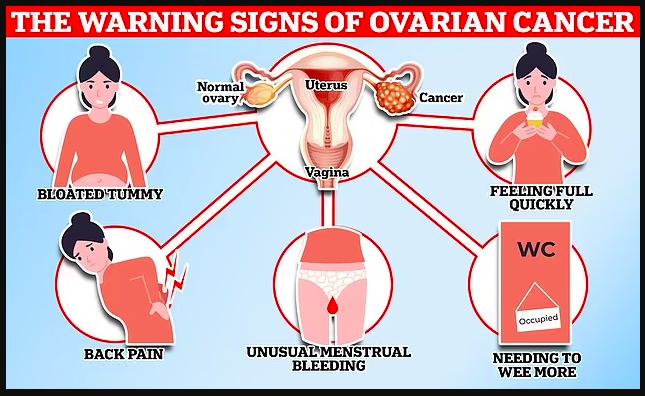Ovarian cancer is often called the “silent killer” because its symptoms are subtle, vague, and sometimes mistaken for less serious health conditions. This leads many women to wonder: do ovarian cancer symptoms come on suddenly, or do they develop gradually over time? The answer is critical because early detection significantly improves treatment outcomes.
Understanding the onset of ovarian cancer symptoms helps women pay closer attention to their bodies. While some health conditions show rapid changes, ovarian cancer usually presents with persistent, progressive symptoms rather than sudden ones. Knowing what to look out for could be lifesaving.
Definition and Overview
Ovarian cancer is a type of cancer that starts in the ovaries, the female reproductive organs responsible for producing eggs and hormones such as estrogen and progesterone. It can spread to nearby tissues, the abdomen, and beyond if left undiagnosed. Because the symptoms can mimic digestive or urinary issues, it is often diagnosed at an advanced stage.
Types
There are several types of ovarian cancer, including:
- Epithelial ovarian cancer: The most common type, starting in the outer layer of the ovaries.
- Germ cell tumors: Rare cancers that develop in the cells that produce eggs.
- Stromal tumors: Arising from hormone-producing ovarian tissue.
Each type can present differently, but all share the challenge of delayed diagnosis due to vague early symptoms.
Causes and Risk Factors
The exact cause of ovarian cancer is unknown, but certain factors increase the risk, including:
- Family history of ovarian or breast cancer
- Inherited genetic mutations such as BRCA1 and BRCA2
- Age (most cases occur after menopause)
- Hormone replacement therapy
- Obesity and poor lifestyle choices
Women with a strong family history should discuss genetic testing with their healthcare providers.
Symptoms and Early Warning Signs
So, do ovarian cancer symptoms come on suddenly? Generally, no. The symptoms tend to develop gradually but become persistent and more noticeable over time. Common warning signs include:
- Persistent bloating
- Abdominal or pelvic pain
- Difficulty eating or feeling full quickly
- Frequent or urgent urination
- Changes in bowel habits
- Fatigue and unexplained weight loss
The key difference from other conditions is that these symptoms persist for weeks and gradually worsen, rather than appearing suddenly and disappearing quickly.
Diagnosis
Doctors use several methods to diagnose ovarian cancer, such as:
- Pelvic examination
- Ultrasound imaging
- Blood tests (CA-125 tumor marker)
- CT or MRI scans
- Biopsy for confirmation
Because symptoms are subtle, women should seek medical advice if they notice persistent or worsening changes in their health.
Treatment Options
Treatment depends on the stage and type of ovarian cancer, but common approaches include:
- Surgery: To remove the tumor and possibly ovaries, fallopian tubes, or uterus.
- Chemotherapy: To target cancer cells throughout the body.
- Targeted therapy: Using drugs designed to attack specific cancer pathways.
- Hormone therapy and radiation therapy: Less common but sometimes used in specific cases.
A personalized treatment plan gives the best chance of recovery.
Prevention and Lifestyle Recommendations
While ovarian cancer cannot always be prevented, some steps may reduce risk:
- Maintaining a healthy weight
- Eating a balanced diet rich in fruits and vegetables
- Regular physical activity
- Considering birth control pills (which may lower risk when used for several years)
- Undergoing genetic counseling if there is a family history
Routine health checkups are essential for early detection.
Prognosis and Survival Rates
Survival rates depend on how early the cancer is detected. When diagnosed at an early stage, the five-year survival rate is much higher. Unfortunately, many women are diagnosed late, lowering survival chances. Advances in treatment, however, continue to improve outcomes even in advanced cases.
Latest Research and Innovations
Ongoing research is focused on:
- Better screening tests to detect ovarian cancer earlier
- Targeted therapies and immunotherapy
- Genetic research to personalize treatment
- Minimally invasive surgical techniques
These innovations bring hope for improved survival and quality of life.
Coping and Support for Patients
A diagnosis of ovarian cancer can be overwhelming. Emotional, psychological, and social support is just as important as medical treatment. Patients are encouraged to:
- Join cancer support groups
- Seek counseling or therapy
- Involve family and friends in care
- Explore complementary therapies like meditation, yoga, or relaxation techniques
Finding a supportive community can help patients cope with the challenges of treatment and recovery.
Conclusion
To answer the key question, do ovarian cancer symptoms come on suddenly: they usually do not. Instead, symptoms develop slowly and persist over time, often overlooked until they become severe. Recognizing these subtle changes, understanding risk factors, and seeking timely medical advice can make a life-saving difference. Raising awareness about ovarian cancer is crucial for early detection and improved survival.
FAQ
1. Can ovarian cancer symptoms appear overnight?
No, they usually develop gradually and persistently rather than suddenly.
2. What is the earliest symptom of ovarian cancer?
Bloating, pelvic discomfort, and changes in appetite are often among the first signs.
3. How long can ovarian cancer go unnoticed?
It may remain unnoticed for months or even years due to its vague symptoms.
4. Can ovarian cancer be detected early?
Early detection is challenging, but regular checkups and awareness of persistent symptoms can help.
5. Is ovarian cancer curable?
When detected early, it is often treatable and sometimes curable. Advanced stages are harder to treat but advances in medicine are improving outcomes.

